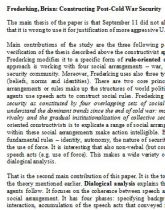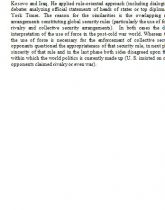Hledej
Zobraz:
Univerzity
Kategorie
Rozšířené vyhledávání
12 659 projektů
0 nových
Frederking, Brian: Constructing Post-Cold War Security
| Přípona .doc |
Typ studijní materiál |
Stažené 0 x |
| Velikost 0,1 MB |
Jazyk český |
ID projektu 9432 |
| Poslední úprava 16.01.2017 |
Zobrazeno 426 x |
Autor: clean.bandit |
 Sdílej na Facebooku
Sdílej na Facebooku |
||
| Detaily projektu | ||
- Cena:
4 Kreditů - kvalita:
77,9% -
Stáhni
- Přidej na srovnání
- Univerzita:Univerzita Karlova v Praze
- Fakulta:Fakulta sociálních věd
- Kategorie:Humanitní vědy » Politologie
- Předmět:Mezinárodní vztahy
- Studijní obor:-
- Ročník:3. ročník
- Formát:MS Office Word (.doc)
- Rozsah A4:2 stran
The main thesis of the paper is that September 11 did not alter the world politics much and that it is wrong to use it for justification of more aggressive U. S. foreign policy.
Main contributions of the study are the three following points. First, for the purpose of verification of the thesis described above the constructivist approach to global security is set. Frederking modifies it to a specific form of rule-oriented constructivism. This theoretical approach is working with four social arrangements - war, rivalry, collective security, and security community. Moreover, Frederking uses also three types of rules mentioned by Onuf (beliefs, norms and identities). There are two core principles of that theory: a) social arrangements or rules make up the structures of world politics; b) communicatively rational agents use speech acts to construct social rules. Frederking states: “Conceptualizing global security as constituted by four overlapping sets of social arrangements is necessary to understand the dominant trends since the end of cold war: movement away from the cold war rivalry and the gradual institutionalization of collective security rules.” The task for rule-oriented constructivists is to explicate a range of social arrangements and show how the rules within these social arrangements make action intelligible. Each social arrangement has six fundamental rules - identity, autonomy, the nature of security, deterrence, enforcement, and the use of force. It is interesting that also non-verbal (but communicative) acts are treated as speech acts (e.g. use of force). This makes a wide variety of social interaction amenable to dialogical analysis.
Main contributions of the study are the three following points. First, for the purpose of verification of the thesis described above the constructivist approach to global security is set. Frederking modifies it to a specific form of rule-oriented constructivism. This theoretical approach is working with four social arrangements - war, rivalry, collective security, and security community. Moreover, Frederking uses also three types of rules mentioned by Onuf (beliefs, norms and identities). There are two core principles of that theory: a) social arrangements or rules make up the structures of world politics; b) communicatively rational agents use speech acts to construct social rules. Frederking states: “Conceptualizing global security as constituted by four overlapping sets of social arrangements is necessary to understand the dominant trends since the end of cold war: movement away from the cold war rivalry and the gradual institutionalization of collective security rules.” The task for rule-oriented constructivists is to explicate a range of social arrangements and show how the rules within these social arrangements make action intelligible. Each social arrangement has six fundamental rules - identity, autonomy, the nature of security, deterrence, enforcement, and the use of force. It is interesting that also non-verbal (but communicative) acts are treated as speech acts (e.g. use of force). This makes a wide variety of social interaction amenable to dialogical analysis.
Klíčová slova:

